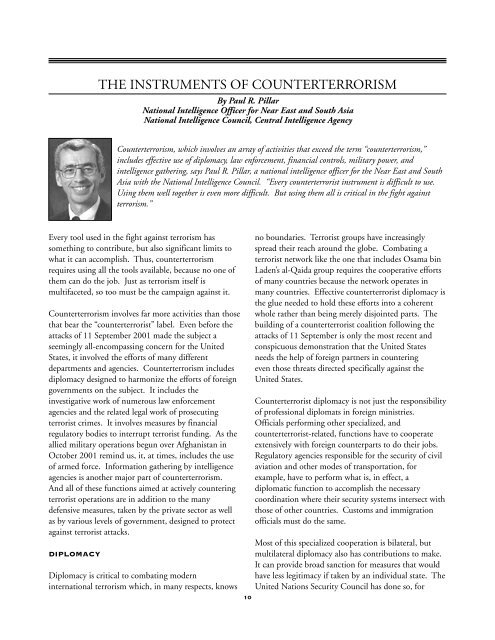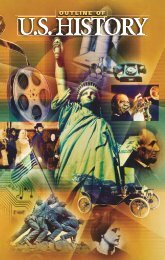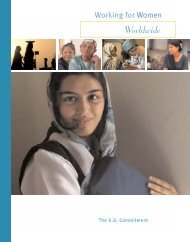Terrorism: Threat Assessment, Countermeasures and Policy
Terrorism: Threat Assessment, Countermeasures and Policy
Terrorism: Threat Assessment, Countermeasures and Policy
Create successful ePaper yourself
Turn your PDF publications into a flip-book with our unique Google optimized e-Paper software.
THE INSTRUMENTS OF COUNTERTERRORISM<br />
By Paul R. Pillar<br />
National Intelligence Officer for Near East <strong>and</strong> South Asia<br />
National Intelligence Council, Central Intelligence Agency<br />
Counterterrorism, which involves an array of activities that exceed the term “counterterrorism,”<br />
includes effective use of diplomacy, law enforcement, financial controls, military power, <strong>and</strong><br />
intelligence gathering, says Paul R. Pillar, a national intelligence officer for the Near East <strong>and</strong> South<br />
Asia with the National Intelligence Council. “Every counterterrorist instrument is difficult to use.<br />
Using them well together is even more difficult. But using them all is critical in the fight against<br />
terrorism.”<br />
Every tool used in the fight against terrorism has<br />
something to contribute, but also significant limits to<br />
what it can accomplish. Thus, counterterrorism<br />
requires using all the tools available, because no one of<br />
them can do the job. Just as terrorism itself is<br />
multifaceted, so too must be the campaign against it.<br />
Counterterrorism involves far more activities than those<br />
that bear the “counterterrorist” label. Even before the<br />
attacks of 11 September 2001 made the subject a<br />
seemingly all-encompassing concern for the United<br />
States, it involved the efforts of many different<br />
departments <strong>and</strong> agencies. Counterterrorism includes<br />
diplomacy designed to harmonize the efforts of foreign<br />
governments on the subject. It includes the<br />
investigative work of numerous law enforcement<br />
agencies <strong>and</strong> the related legal work of prosecuting<br />
terrorist crimes. It involves measures by financial<br />
regulatory bodies to interrupt terrorist funding. As the<br />
allied military operations begun over Afghanistan in<br />
October 2001 remind us, it, at times, includes the use<br />
of armed force. Information gathering by intelligence<br />
agencies is another major part of counterterrorism.<br />
And all of these functions aimed at actively countering<br />
terrorist operations are in addition to the many<br />
defensive measures, taken by the private sector as well<br />
as by various levels of government, designed to protect<br />
against terrorist attacks.<br />
DIPLOMACY<br />
Diplomacy is critical to combating modern<br />
international terrorism which, in many respects, knows<br />
10<br />
no boundaries. Terrorist groups have increasingly<br />
spread their reach around the globe. Combating a<br />
terrorist network like the one that includes Osama bin<br />
Laden’s al-Qaida group requires the cooperative efforts<br />
of many countries because the network operates in<br />
many countries. Effective counterterrorist diplomacy is<br />
the glue needed to hold these efforts into a coherent<br />
whole rather than being merely disjointed parts. The<br />
building of a counterterrorist coalition following the<br />
attacks of 11 September is only the most recent <strong>and</strong><br />
conspicuous demonstration that the United States<br />
needs the help of foreign partners in countering<br />
even those threats directed specifically against the<br />
United States.<br />
Counterterrorist diplomacy is not just the responsibility<br />
of professional diplomats in foreign ministries.<br />
Officials performing other specialized, <strong>and</strong><br />
counterterrorist-related, functions have to cooperate<br />
extensively with foreign counterparts to do their jobs.<br />
Regulatory agencies responsible for the security of civil<br />
aviation <strong>and</strong> other modes of transportation, for<br />
example, have to perform what is, in effect, a<br />
diplomatic function to accomplish the necessary<br />
coordination where their security systems intersect with<br />
those of other countries. Customs <strong>and</strong> immigration<br />
officials must do the same.<br />
Most of this specialized cooperation is bilateral, but<br />
multilateral diplomacy also has contributions to make.<br />
It can provide broad sanction for measures that would<br />
have less legitimacy if taken by an individual state. The<br />
United Nations Security Council has done so, for












